- Home
- Dennis Lehane
Boston Noir 2 Page 11
Boston Noir 2 Read online
Page 11
I got into line ahead of him and ordered, after long deliberation, a BLT on toast. While the guy made it up and shoved it on a plate with three measly potato chips and a sliver of pickle you could barely see, I searched through my wallet, opened my change purse, counted out silver, got to $1.60 on the last five pennies. The counterman sang out, "That'll be a buck eighty-five." I pawed through my pockets, found a nickel, two pennies. The line was growing restive. I concentrated on looking like a damsel in need of a knight, a tough task for a woman over six feet.
Roger (I didn't know he was Roger then) smiled ruefully and passed over a quarter. I was effusive in my thanks. I sat at a table for two, and when he'd gotten his tray (ham-and-cheese and a strawberry ice cream soda), I motioned him into my extra chair.
He was a sweetie. Sitting down, he forgot the difference in our height, and decided I might be someone he could talk to. I encouraged him. I hung shamelessly on his every word. A Harvard man, imagine that. We got around slowly, ever so slowly, to his work at the admissions office. He wanted to duck it and talk about more important issues, but I persisted. I'd been thinking about getting a job at Harvard, possibly in admissions. What kind of people did he work with? Were they congenial? What was the atmosphere like? Was it a big office? How many people? Men? Women? Any soulmates? Readers? Or just, you know, office people?
According to him, every soul he worked with was brain dead. I interrupted a stream of complaint with "Gee, I know somebody who works for Harvard. I wonder if you know her."
"It's a big place," he said, hoping to avoid the whole endless business.
"I met her at a party. Always meant to look her up." I searched through my bag, found a scrap of paper and pretended to read Marcia Heidegger's name off it.
"Marcia? Geez, I work with Marcia. Same office."
"Do you think she likes her work? I mean, I got some strange vibes from her," I said. I actually said "strange vibes" and he didn't laugh his head off. People in the Square say things like that and other people take them seriously.
His face got conspiratorial, of all things, and he leaned closer to me.
"You want it, I bet you could get Marcia's job."
"You mean it?" What a compliment—a place for me among the brain dead.
"She's gonna get fired if she doesn't snap out of it."
"Snap out of what?"
"It was bad enough working with her when she first came over. She's one of those crazy neat people, can't stand to see papers lying on a desktop, you know? She almost threw out the first chapter of my thesis!"
I made a suitably horrified noise and he went on.
"Well, you know, about Marcia, it's kind of tragic. She doesn't talk about it."
But he was dying to.
"Yes?" I said, as if he needed egging on.
He lowered his voice. "She used to work for Justin Thayler over at the law school, that guy in the news, whose wife got killed. You know, her work hasn't been worth shit since it happened. She's always on the phone, talking real soft, hanging up if anybody comes in the room. I mean, you'd think she was in love with the guy or something, the way she . . ."
I don't remember what I said. For all I know, I may have volunteered to type his thesis. But I got rid of him somehow and then I scooted around the corner of Church Street and found a pay phone and dialed Mooney.
"Don't tell me," he said. "Somebody mugged you, but they only took your trading stamps."
"I have just one question for you, Moon."
"I accept. A June wedding, but I'll have to break it to Mother gently."
"Tell me what kind of junk Justin Thayler collected."
I could hear him breathing into the phone.
"Just tell me," I said, "for curiosity's sake."
"You onto something, Carlotta?"
"I'm curious, Mooney. And you're not the only source of information in the world."
"Thayler collected Roman stuff. Antiques. And I mean old. Artifacts, statues—"
"Coins?"
"Whole mess of them."
"Thanks."
"Carlotta—"
I never did find out what he was about to say because I hung up. Rude, I know. But I had things to do. And it was better Mooney shouldn't know what they were, because they came under the heading of illegal activities.
When I knocked at the front door of the Mason Terrace house at ten a.m. the next day, I was dressed in dark slacks, a white blouse, and my old police department hat. I looked very much like the guy who reads your gas meter. I've never heard of anyone being arrested for impersonating the gasman. I've never heard of anyone really giving the gasman a second look. He fades into the background and that's exactly what I wanted to do.
I knew Marcia Heidegger wouldn't be home for hours. Old reliable had left for the Square at her usual time, precise to the minute. But I wasn't 100 percent sure Marcia lived alone. Hence the gasman. I could knock on the door and check it out.
Those Brookline neighborhoods kill me. Act sneaky and the neighbors call the cops in twenty seconds, but walk right up to the front door, knock, talk to yourself while you're sticking a shim in the crack of the door, let yourself in, and nobody does a thing. Boldness is all.
The place wasn't bad. Three rooms, kitchen and bath, light and airy. Marcia was incredibly organized, obsessively neat, which meant I had to keep track of where everything was and put it back just so. There was no clutter in the woman's life. The smell of coffee and toast lingered, but if she'd eaten breakfast, she'd already washed, dried, and put away the dishes. The morning paper had been read and tossed in the trash. The mail was sorted in one of those plastic accordion files. I mean, she folded her underwear like origami.
Now coins are hard to look for. They're small; you can hide 'em anywhere. So this search took me one hell of a long time. Nine out of ten women hide things that are dear to them in the bedroom. They keep their finest jewelry closest to the bed, sometimes in the nightstand, sometimes right under the mattress. That's where I started.
Marcia had a jewelry box on top of her dresser. I felt like hiding it for her. She had some nice stuff and a burglar could have made quite a haul with no effort.
The next favorite place for women to stash valuables is the kitchen. I sifted through her flour. I removed every Kellogg's Rice Krispy from the giant economy-sized box—and returned it. I went through her place like no burglar ever will. When I say thorough, I mean thorough.
I found four odd things. A neatly squared pile of clippings from the Globe and the Herald, all the articles about the Thayler killing. A manila envelope containing five different safe deposit box keys. A Tupperware container full of superstitious junk, good luck charms mostly, the kind of stuff I'd never have associated with a straight-arrow like Marcia: rabbits' feet galore, a little leather bag on a string that looked like some kind of voodoo charm, a pendant in the shape of a cross surmounted by a hook, and, I swear to God, a pack of worn tarot cards. Oh, yes, and a .22 automatic, looking a lot less threatening stuck in an ice cube tray. I took the bullets; the loaded gun threatened a defenseless box of Breyers mint chocolate-chip ice cream.
I left everything else just the way I'd found it and went home. And tugged my hair. And stewed. And brooded. And ate half the stuff in the refrigerator. I kid you not.
At about one in the morning, it all made blinding, crystal-clear sense.
The next afternoon, at five fifteen, I made sure I was the cabbie who picked up Marcia Heidegger in Harvard Square. Now cabstands have the most rigid protocol since Queen Victoria; you do not grab a fare out of turn or your fellow cabbies are definitely not amused. There was nothing for it but bribing the ranks. This bet with Mooney was costing me plenty.
I got her. She swung open the door and gave the Mason Terrace number. I grunted, kept my face turned front, and took off.
Some people really watch where you're going in a cab, scared to death you'll take them a block out of their way and squeeze them for an extra nickel. Others just lean back and dream
. She was a dreamer, thank God. I was almost at District One headquarters before she woke up.
"Excuse me," she said, polite as ever, "that's Mason Terrace in Brookline."
"Take the next right, pull over, and douse your lights," I said in a low Bogart voice. My imitation was not that good, but it got the point across. Her eyes widened and she made an instinctive grab for the door handle.
"Don't try it, lady," I Bogied on. "You think I'm dumb enough to take you in alone? There's a cop car behind us, just waiting for you to make a move."
Her hand froze. She was a sap for movie dialogue.
"Where's the cop?" was all she said on the way up to Mooney's office.
"What cop?"
"The one following us."
"You have touching faith in our law-enforcement system," I said.
She tried to bolt, I kid you not. I've had experience with runners a lot trickier than Marcia. I grabbed her in approved cop hold number three and marched her into Mooney's office.
He actually stopped typing and raised an eyebrow, an expression of great shock for Mooney.
"Citizen's arrest," I said.
"Charges?"
"Petty theft. Commission of a felony using a firearm." I rattled off a few more charges, using the numbers I remembered from cop school.
"This woman is crazy," Marcia Heidegger said with all the dignity she could muster.
"Search her," I said. "Get a matron in here. I want my $4.82 back."
Mooney looked like he agreed with Marcia's opinion of my mental state. He said, "Wait up, Carlotta. You'd have to be able to identify that $4.82 as yours. Can you do that? Quarters are quarters. Dimes are dimes."
"One of the coins she took was quite unusual," I said. "I'm sure I'd be able to identify it."
"Do you have any objection to displaying the change in your purse?" Mooney said to Marcia. He got me mad the way he said it, like he was humoring an idiot.
"Of course not," old Marcia said, cool as a frozen daiquiri.
"That's because she's stashed it somewhere else, Mooney," I said patiently. "She used to keep it in her purse, see. But then she goofed. She handed it over to a cabbie in her change. She should have just let it go, but she panicked because it was worth a pile and she was just babysitting it for someone else. So when she got it back, she hid it somewhere. Like in her shoe. Didn't you ever carry your lucky penny in your shoe?"
"No," Mooney said. "Now, Miss—"
"Heidegger," I said clearly. "Marcia Heidegger. She used to work at Harvard Law School." I wanted to see if Mooney picked up on it, but he didn't. He went on: "This can be taken care of with a minimum of fuss. If you'll agree to be searched by—"
"I want to see my lawyer," she said.
"For $4.82?" he said. "It'll cost you more than that to get your lawyers up here."
"Do I get my phone call or not?"
Mooney shrugged wearily and wrote up the charge sheet. Called a cop to take her to the phone.
He got JoAnn, which was good. Under cover of our old-friend-long-time-no-see greetings, I whispered in her ear.
"You'll find it fifty well spent," I said to Mooney when we were alone.
JoAnn came back, shoving Marcia slightly ahead of her. She plunked her prisoner down in one of Mooney's hard wooden chairs and turned to me, grinning from ear to ear.
"Got it?" I said. "Good for you."
"What's going on?" Mooney said.
"She got real clumsy on the way to the pay phone," JoAnn said. "Practically fell on the floor. Got up with her right hand clenched tight. When we got to the phone, I offered to drop her dime for her. She wanted to do it herself. I insisted and she got clumsy again. Somehow this coin got kicked clear across the floor."
She held it up. The coin could have been a dime, except the color was off: warm, rosy gold instead of dead silver. How I missed it the first time around I'll never know.
"What the hell is that?" Mooney said.
"What kind of coins were in Justin Thayler's collection?" I asked. "Roman?"
Marcia jumped out of the chair, snapped her bag open, and drew out her little .22. I kid you not. She was closest to Mooney and she just stepped up to him and rested it above his left ear. He swallowed, didn't say a word. I never realized how prominent his Adam's apple was. JoAnn froze, hand on her holster.
Good old reliable, methodical Marcia. Why, I said to myself, why pick today of all days to trot your gun out of the freezer? Did you read bad luck in your tarot cards? Then I had a truly rotten thought. What if she had two guns? What if the disarmed .22 was still staring down the mint chocolate-chip ice cream?
"Give it back," Marcia said. She held out one hand, made an impatient waving motion.
"Hey, you don't need it, Marcia," I said. "You've got plenty more. In all those safe deposit boxes."
"I'm going to count to five—" she began.
"Were you in on the murder from day one? You know, from the planning stages?" I asked. I kept my voice low, but it echoed off the walls of Mooney's tiny office. The hum of everyday activity kept going in the main room. Nobody noticed the little gun in the well-dressed lady's hand. "Or did you just do your beau a favor and hide the loot after he iced his wife? In order to back up his burglary tale? I mean, if Justin Thayler really wanted to marry you, there is such a thing as divorce. Or was old Jennifer the one with the bucks?"
"I want that coin," she said softly. "Then I want the two of you"—she motioned to JoAnn and me—"to sit down facing that wall. If you yell, or do anything before I'm out of the building, I'll shoot this gentleman. He's coming with me."
"Come on, Marcia," I said, "put it down. I mean, look at you. A week ago you just wanted Thayler's coin back. You didn't want to rob my cab, right? You just didn't know how else to get your good luck charm back with no questions asked. You didn't do it for the money, right? You did it for love. You were so straight you threw away the cash. Now here you are with a gun pointed at a cop—"
"Shut up!"
I took a deep breath and said, "You haven't got the style, Marcia. Your gun's not even loaded."
Mooney didn't relax a hair. Sometimes I think the guy hasn't ever believed a word I've said to him. But Marcia got shook. She pulled the barrel away from Mooney's skull and peered at it with a puzzled frown. JoAnn and I both tackled her before she got a chance to pull the trigger. I twisted the gun out of her hand. I was almost afraid to look inside. Mooney stared at me and I felt my mouth go dry and a trickle of sweat worm its way down my back.
I looked.
No bullets. My heart stopped fibrillating, and Mooney actually cracked a smile in my direction.
* * *
So that's all. I sure hope Mooney will spread the word around that I helped him nail Thayler. And I think he will; he's a fair kind of guy. Maybe it'll get me a case or two. Driving a cab is hard on the backside, you know?
BLANCHE CLEANS UP (excerpt)
BY BARBARA NEELY
Brookline
(Originally published in 1998)
Curiosity—disguised as helping Carrie hand around the canapés—carried Blanche into the library where the guests had gathered for drinks before lunch.
Blanche was generally delighted to come across a group of black people, but her stomach dropped when she saw that the They Brindle had referred to were what she called The Downtown Leadership—the black men who the big downtown white folks talked to when they needed blacks with positions and titles to support the latest cut in programs for the poor, or to amen some closet racist like Brindle. Do the Brindles of the world really think we're all stupid enough to believe that shit is sunshine because the idiot who says so is black?
She recognized Ralph Gordon, the new head of the Roxbury Outpatient Care Center. His face had been all over the papers a couple of months ago when the powers that be hired him after firing the woman who'd directed the health center for years. Her mistake had been complaining about cuts in her budget to the newspapers. Gordon was talking to James McGovern, the head of
the Association of Afro Execs. He kept himself in the news by complaining about affirmative action and lying about black women taking jobs away from black men. Jonathan Carstairs, a lawyer who'd run for city councillor from Roxbury, was guzzling something from a highball glass. His campaign platform had included arresting welfare mothers if their kids got into trouble. Naturally, he'd lost the election. Blanche thought of him as a prime example of how racism made black people crazy. A tall, paunchy man Blanche thought was a high muckety-muck at one of the banks and a couple of men she didn't recognize were hovering around Felicia Brindle.
She watched Allister Brindle work the room, shaking hands and slapping backs. Was it phoniness that made him look like he was made of cardboard? His guests melted before him like butter under a hot knife. The talk was partly about sports and partly a sermon from Brindle against those homos, welfare mothers, and drug-dealing teenage gangsters who were ruining the Commonwealth and the country. Blanche kept waiting for one of the guests to take exception. None did.
Blanche wasn't at all surprised that nobody from what she considered the helpful groups in the community was there. It wasn't likely any of them would be hanging out with someone as far right as Allister Brindle. Like Allister had said, this was a paying gig. Every one of these suckers expected something in return for their sellout—a slot on some board of directors, some photos of them with the governor to hang in their offices and homes as a sign that they were somebody, or a reference to them in the newspaper as black leaders, which was important because they were leaders nobody followed.
Except for one of them.
Why was Maurice Samuelson hanging around Brindle? The Reverend Maurice Samuelson, founder of the Temple of the Divine Enlightenment. He certainly wasn't a leader without followers. She'd walked by Samuelson's temple a couple of times just before services began, and there'd been so many people, mostly women, trying to get in, she'd had to cross the street. He was also probably the only one of these boys who actually lived in Roxbury, where most blacks in Boston lived. There were signs all over Roxbury about the temple and its programs for elders and young people. He was the best-known outside of Boston, too. There'd been a story about Samuelson in Jet magazine. The article said his temple was a new kind of African-American religion where Christian, Jewish, and Muslim holy books and beliefs were mixed together. She watched him as she offered the tray around the room.

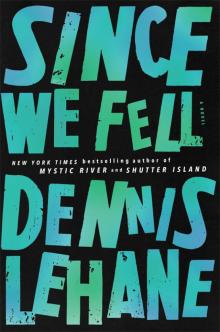 Since We Fell
Since We Fell Prayers for Rain
Prayers for Rain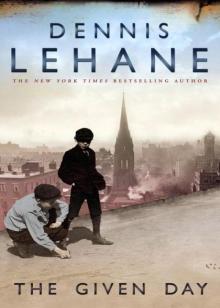 The Given Day
The Given Day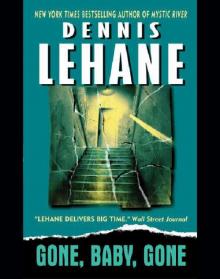 Gone, Baby, Gone
Gone, Baby, Gone Mystic River
Mystic River A Drink Before the War
A Drink Before the War Shutter Island
Shutter Island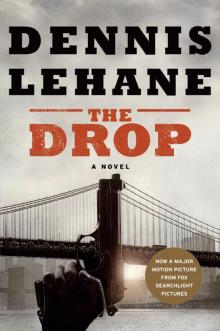 The Drop
The Drop Moonlight Mile
Moonlight Mile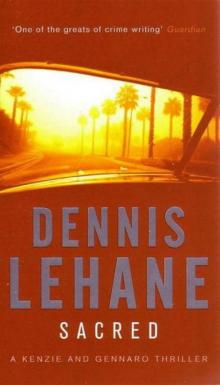 Sacred
Sacred World Gone By
World Gone By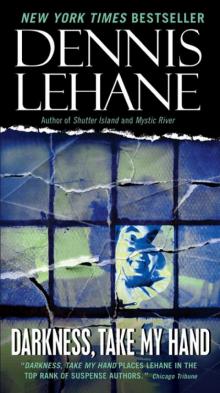 Darkness, Take My Hand
Darkness, Take My Hand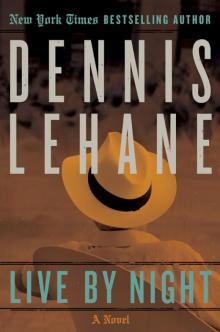 Live by Night
Live by Night World Gone By: A Novel
World Gone By: A Novel Coronado
Coronado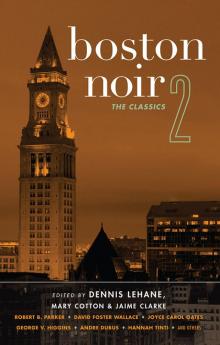 Boston Noir 2
Boston Noir 2 World Gone By: A Novel (Joe Coughlin Series)
World Gone By: A Novel (Joe Coughlin Series)